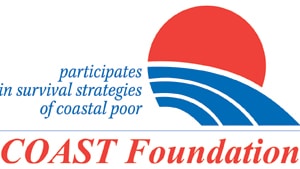COAST is not minimalist in its micro finance (MF) programs i.e., it is not only exclusively for income enhancement, tailoring to greater empowerment, it has policy direction in this regard title “ Giving Human Face in Micro Finance”, these are i.) MF program should be tailored to greater contribution to poverty reduction and social welfare, ii.) MF is not only a mere service; it is a socially responsible business, iii.) MF program has to be appropriate to livelihood activities of the locality, iv.) MF program should be a part of a holistic approach of empowering people i.e., facilitating capacities on realization of their rights as active citizen. v.) Poor have to do savings for their own capital accumulation and also to meet the expenses during crisis period. vi.) MF management should be transparent, accountable and participatory especially to its clients., and vii.) There should not be any compromise in respect of maintaining standard professionalism in MF management.
The good governance programs in COAST have four components i.e., i. social mobilization to mediate legitimate demand of the poor, and ii. facilitating access to the local government, iii, institutionalizing democracy and iv. advocacy for policy and behavioral changes (i.e., to minimize gaps between policy declaration and policy implementation especially of the state agencies).
In respect of institution building it is the formation of people’s organization (PO) and leadership development among the poor in the level of groups, Union, Upazila, project and central management of COAST. The POs is not only for social mobilization for legitimate demand mediation, it is also of participation / consultation in management of the programs and organization. POs participation in organizational matters has been systematically integrated.
There are weekly sensitizing lessons in the groups as a part of development education program, This has been prepared in view of functional and program objectives, the lessons is also integrated to the providing space for practicing literacy to the neo-literate member participants.
Apart from all those components of core programs there are non-core programs, which is either partly cost recovery basis or fully supported by external funding. COAST emphasizes cost recovery and gradual diminishing of external dependency.
CITEP (Coastal Integrated Technology Extension Program) objective is basically to provide nutritional intake to pregnant mothers and children of poor families, promoting commercially viable income generating activities in integrated agriculture not endangering the ecology, promotion and preservation of local species and plants especially to protect the farmers from patents rights and seed business. In this relation COAST has linked with different national and international networks for campaign and advocacy.
COAST emphasizes to support community initiatives on education so that in one stages the education institutions either solely run by community or taken over by the government. In Bhola there are so far 25 such schools have been taken over by government and in all the projects COAST support around 10 schools so far. Apart from these there are components on community accountability for quality education, which will be the part of governance program. REFLECT (Shonglap-Dialog) have been tailored to the need of adolescent girls and they are involved with their self income generating activities.
Having long experiences in disaster mitigation, COAST believes in sustainable capacity building of communities. So it is being integrated in all the programs. In long term, the organization is also building a capacity so that any emergency response is not depended on the external assistance. Breaking the isolation, i.e., communication is fundamental in respect of mitigating disaster, COAST has already established strong radio communication along with two rescue boats in its working area which will also serve the purpose of disaster tracking and operating rescue program during disaster.


